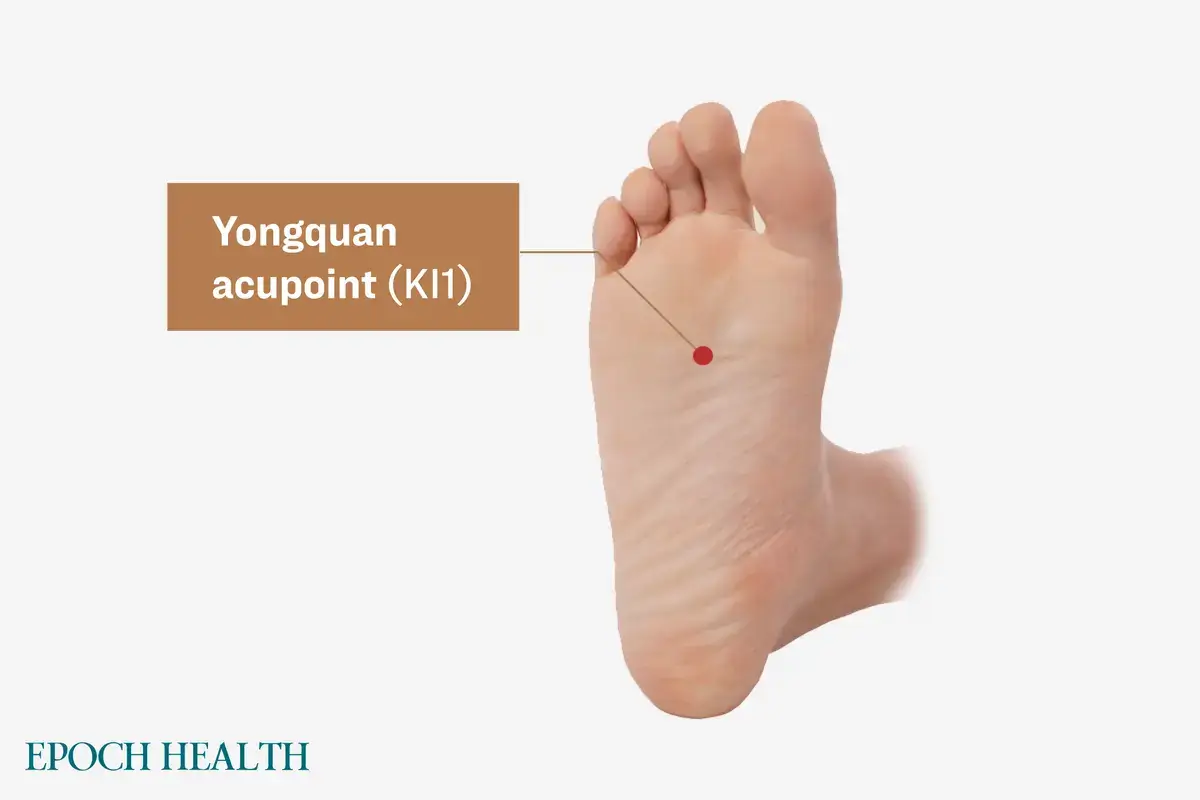
3 Expert Tips For Kidney Health: Promoting Longevity & Well-Being
Special care to the kidneys through diet therapy, acupressure massage, and exercise—particularly from middle age onward—is crucial for good health.
By: Naiwen Hu | The Epoch Times
Middle age often brings with it feelings of fatigue and occasional diminished mental agility, especially for those with significant work and life stresses and who frequently stay up late. Traditional Chinese medicine (TCM) attributes these symptoms to the declining function of the kidneys. To achieve longevity and good health, special attention to protecting and nourishing the kidneys from middle age onward is crucial.
According to the classic Chinese medical text, “The Yellow Emperor’s Classic of Internal Medicine,” the essence of the kidneys is the foundation of life, determining one’s vitality. Kidney deficiency can lead to insufficient qi and blood in the entire body, resulting in persistent fatigue. The kidney’s energy system also governs the bones and brain. In other words, poor kidney function not only increases the risk of osteoporosis but also affects the brain, causing cognitive sluggishness and exhaustion. Typically, signs of declining kidney qi appear in women around the age of 35 and men around the age of 40.
To maintain kidney health, it is essential to first break four habits that some people have that harm the kidneys. Additionally, one can also use natural methods such as diet therapy, acupressure massage, and exercise to nourish and support kidney function.
4 Habits That May Be Harming Your Kidneys
- Staying Up Late
Research has found that insufficient sleep may increase the risk of proteinuria (elevation of protein in the urine) and that those with shorter sleep durations have a higher prevalence of chronic kidney disease.
Staying up late may harm the liver and kidneys, impeding the body’s detoxification process. Coupled with stress, insufficient sleep can accelerate kidney degeneration. It is recommended to change your nightly routine by going to bed 10 minutes earlier each night, gradually breaking the habit of staying up late. You will then notice not only an increase in energy levels but also a healthier complexion.
- Improper Use of Medicines & Supplements
Long-term consumption of over-the-counter medications or certain health supplements can also place a significant burden on the kidneys, potentially leading to kidney failure. It is advisable to consult a trusted physician before taking any medication or health supplements.
- Holding Urine
Due to busy work schedules or other constraints, some tend to hold their urine, placing excessive strain on the kidneys. This can lead to deterioration in kidney function and even result in issues such as frequent urination, urinary urgency, and urinary incontinence. It is recommended to cultivate a habit of urinating regularly to avoid subjecting the kidneys to unnecessary stress.
- Drinking Sugary Beverages
Water is the best cleanser for the kidneys. Drinking an adequate amount of water can help the kidneys eliminate waste and toxins from the body. However, excessive consumption of sugary beverages can burden the liver and kidneys as they metabolize the fructose contained in these drinks. Over time, this can lead to potential harm to the kidneys. To mitigate this risk, consider reducing sugary beverage intake by one cup per week and increasing water consumption to maintain hydration levels.
Top 4 Heart-Healthy Fruits Enhance Cardiovascular Protection
3 Natural Methods To Nourish & Support Kidney Health
- Diet Therapy
- Black-Coloured Foods & Yams. It is recommended to regularly eat black-coloured foods such as black beans and black sesame seeds, and incorporate more yams into your diet. Black beans promote hair health, nourish the kidneys, and reduce swelling. Black sesame seeds help prevent anemia, improve limb weakness, and alleviate dizziness. Yams can replenish qi and nourish the kidneys, making them particularly beneficial for men’s health.
- In TCM, Qi Refers To The Life Energy of The Human Body. Apart from the innate “congenital qi” endowed at birth, it also relies on supplementation from acquired nutrition and oxygen intake. Deficiency in qi can lead to fatigue and increased susceptibility to illness.
- Ciwujia Tea. Ciwujia tea can replenish qi and combat fatigue, making it beneficial for individuals with demanding mental work or high levels of stress. Both ciwujia and ginseng belong to the Araliaceae family and have qi-replenishing effects, which can alleviate fatigue caused by oxygen deficiency in the body. Ciwujia tea has a subtle herbal taste with a mild sweetness, making it ideal for drinking daily. This herb is typically available in TCM herbal stores.
The Journal of Ethnopharmacology published a comprehensive review in 2021, summarizing global systematic investigations on ciwujia from 1965 to 2020. Ciwujia has long been used in traditional medicine to invigorate the liver and kidneys, replenish qi, strengthen bones and tendons, enhance appetite, and improve memory. Additionally, modern pharmacological studies have also found it to be beneficial for the cardiovascular, central nervous, and immune systems.
Preparation: Place approximately three to four grams of ciwujia in a filter bag, place it in a cup, add hot water, and let it steep for five minutes before drinking.
- Angelica, Ginger, and Lamb Soup. Angelica, ginger, and lamb soup can replenish the blood and dispel cold, making it particularly suitable for individuals with poor complexion, easy fatigue, dizziness, and asthma. It also helps alleviate fatigue caused by blood deficiency.
Lamb is a rich source of heme iron, which is highly bioavailable, making it beneficial for individuals with iron deficiency anemia. Angelica can replenish and activate the blood, while ginger can dispel cold and warm the body, providing a warm sensation and alleviating cold extremities. For vegetarians, tofu and mushrooms can serve as substitutes for lamb.
A review, published in the journal Molecules, indicated that Angelica herb possesses “antioxidant, anti-inflammatory, anti-diabetic, antimicrobial, skin-whitening … and hepatoprotective properties,” among others. Additionally, Angelica can improve chronic kidney disease and reduce the risk of mortality in patients with this condition.
- Yongquan Acupoint Massage
In addition to diet therapy, massaging the Yongquan acupoint also helps nourish the kidneys. This acupoint is located in the depression at the front one-third of the sole, which is also the starting point of the kidney meridian. Massaging it can alleviate soreness and promote the transportation of qi and blood to the hair follicles, thereby improving issues such as hair loss or greying.
Instructions: Grip the top of the foot with four fingers, then press the Yongquan acupoint using the thumb while simultaneously circling and massaging. This technique can help alleviate kidney fatigue.
According to TCM, meridians are the channels through which energy flows in the human body, responsible for transporting qi and blood throughout the body. When there is a deficiency of qi and blood in a certain organ, diseases or other conditions may occur. By stimulating specific acupoints along the meridians through techniques such as acupuncture and massage, it is possible to treat diseases related to the corresponding organs.

- Quadriceps Strengthening Exercise
In TCM, the kidneys are believed to govern the bones, and the strength of kidney function is directly related to bone quality, a finding consistent with modern scientific research. Numerous studies have found that chronic kidney disease can lead to deterioration in bone quality and density.
Osteoporosis and related fractures are particularly common among patients with advanced kidney disease. In fact, research has shown that patients with chronic kidney disease face a fracture rate at least four times higher than that of the general population, and the incidence of fractures increases with the deterioration of kidney function.
As people age, their muscle mass and strength tend to decline, which is associated with the deterioration of kidney function. Therefore, it is essential to start strengthening muscles early to reduce the risk of osteoporosis and fractures. The elderly, in particular, should be cautious of hip fractures, as studies have shown that the mortality rate within 365 days after such fractures can be as high as 28.2%.
So how can we prevent such fatal fractures? One simple solution is to strengthen the quadriceps muscles (the muscles on the front side of the thigh), thereby enhancing support for the hips.
- While seated on a chair, lift one leg straight up, hold for one to two seconds, then lower it down. Switch to the other leg and repeat the same motion. Perform this exercise for 20 repetitions with each leg, spending approximately three minutes on each set.
- While performing this exercise, make sure to engage the hip joints, as the purpose of this movement is to protect them.
In summary, it is highly advisable to break harmful habits that affect the kidneys and create new ones to support their health. Consistency is the key to effective natural kidney care methods.
Note: Some herbs mentioned in this article may be unfamiliar, but are generally available in health food and Asian grocery stores. Treatment methods may vary depending on the individual. Please consult with a health care professional for a specific treatment plan.
* * *
Must Have: For a delightful berry assortment, try a mix of fresh strawberries, blueberries, raspberries, and blackberries from Amazon’s Top-Rated suppliers.
* * *
NEXT UP!
Internet’s ‘Miracle Antibiotic’ Withstands Scientific Investigation
Social media posts featuring strange decoctions and peculiar natural treatments flood the internet daily, offering hope to those seeking alternatives to established pharmaceutical approaches. A growing number of people are striving to increase their knowledge about herbal remedies, self-applied formulas, and homemade plant-derived compounds, also known as phytopharmaceuticals.
Although this trend certainly spreads awareness and responsibility for one’s well-being, not all health news circulating on the internet is trustworthy.
With the advent of every new movement come those who want to exploit innocent souls for personal profit and power. Therefore, it is smart to apply the principle of “caveat emptor”—caution, common sense, or simply a “buyer beware” attitude.
* * *
READ MORE: Harvard Scientist Stunned: Oreos Surpass Statins In Lowering His Cholesterol
Awareness! Are The Benefits of Probiotics Overstated?
Telegram: Stay connected and get the latest updates by following us on Telegram!
We’d love to hear from you! If you have a comment about this article or if you have a tip for a future Collective Spark Story please let us know below in the comment section.
